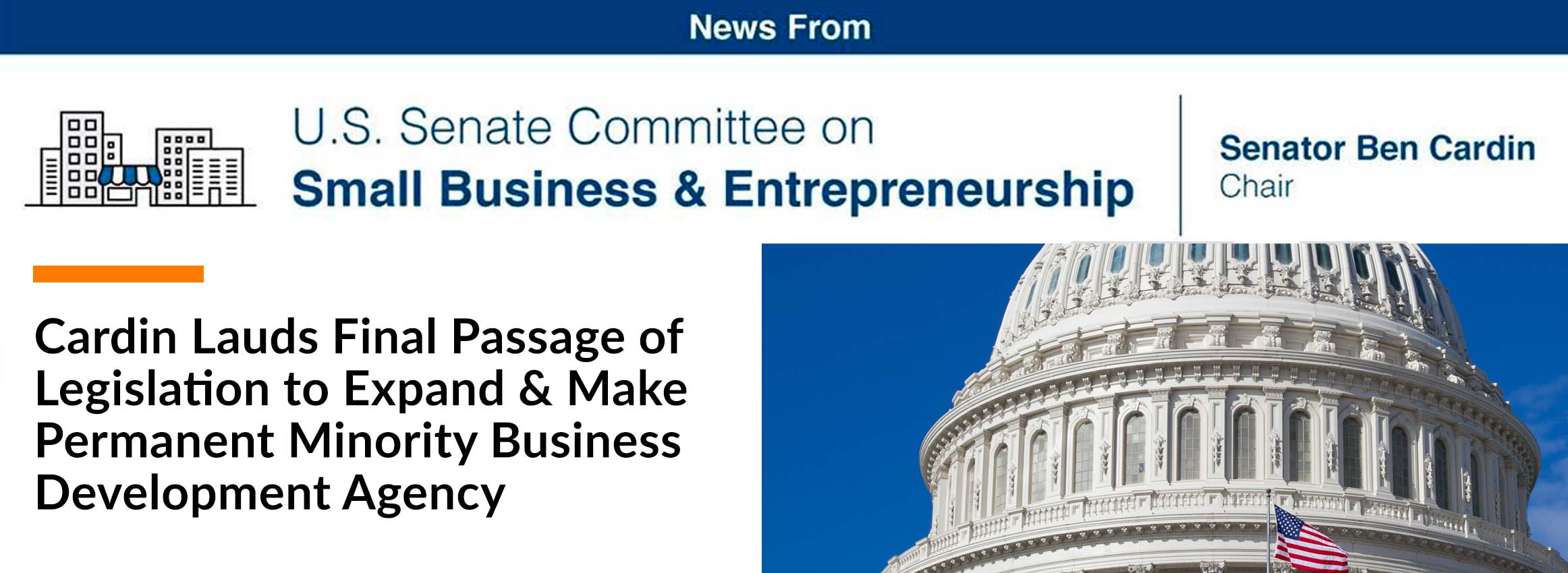
For Immediate Release
November 9, 2021
Contact:
Fabion Seaton
(202) 880-4217
Cardin Lauds Final Passage of Legislation to Expand & Make Permanent Minority Business Development Agency
Measure Included in the Bipartisan Infrastructure Investment and Jobs Act
(Washington, D.C.) — U.S. Senate Committee on Small Business and Entrepreneurship Chair Ben Cardin (D-Md.) today issued the following statement on final passage of his legislation to make permanent and expand the Minority Business Development Agency (MBDA), which was included in the bipartisan Infrastructure Investment and Jobs Act:
“The Minority Business Development Agency will now have the stability and resources to help small businesses in minority communities grow and create jobs. It is reassuring to know that Congress finally has taken action to make permanent and expand the MBDA – the only federal agency solely dedicated to supporting minority-owned businesses. The COVID-19 pandemic clearly demonstrated the federal government’s critical role in removing the historic barriers that prevent minorities from starting and growing businesses. I am proud that the MBDA will continue to lead the way in breaking down these barriers.
“This accomplishment was decades in the making, and it would not have been possible without the efforts of countless minority business leaders, who have been advocating for decades for the MBDA to be made permanent. It is now even more important that Congress maximize the once-in-a-generation opportunity in front of us by passing President Biden’s Build Back Better Budget, which will provide funding for the MBDA to invest in minority businesses.”
The MBDA was originally established by Executive Order as the Office of Minority Business Enterprises by President Richard Nixon on March 5, 1969. For nearly 50 years, the Congress has appropriated funding for the MBDA on a bipartisan basis although the agency was never written in statute. The MBDA is the only federal agency solely dedicated to supporting the development and expansion of minority business enterprises (MBEs).
MBEs have been among the businesses hardest hit during the pandemic. According to a National Bureau of Economic Research analysis of the impact of COVID-19 on small businesses from February to April 2020, an estimated 41 percent of Black-owned businesses, 32 percent of Latino-owned businesses, and 26 percent of Asian-owned businesses closed, as compared to 17 percent of white-owned businesses.
The disproportionate impact of the COVID-19 pandemic on minority-owned businesses reflects long-standing racial disparities in access to capital, mentorship, and technical training. MBEs are more likely to be denied loans than non-MBEs; on average, the annual gross receipts reported by MBEs are only one-third of the annual gross receipts reported by non-MBEs. MBEs are also half as likely as non-MBEs to have employees.
The pandemic has also shown that concerted effort from the federal government can address capital access disparities. A report issued by the Government Accountability Office (GAO) last month found that policies championed by Cardin to make the Paycheck Protection Program (PPP) more equitable successfully increased access to PPP loans for underserved small businesses.
Despite initial access challenges, the GAO concluded that PPP loan disbursement in high-minority counties exceeded their relative share of small businesses. At the conclusion of the program, businesses in high-minority counties received 50% of all PPP loans and account for 47% of all small businesses nationwide.
Building on those lessons, Cardin’s MBDA bill seeks to meet the challenges faced by minority entrepreneurs directly. The measure will expand the geographic reach of the MBDA by authorizing the creation of regional MBDA offices and rural business centers to be administered through Historically Black Colleges and Universities (HBCUs) and minority serving institutions (MSIs), and it will create the Parren J. Mitchel Entrepreneurship Education Grants Program to cultivate the next generation of minority entrepreneurs on the campuses of our nation’s HBCUs and MSIs. The legislation will also increase the MBDA’s grant-making capacity to partner with community and national nonprofits engaged in private and public sector development as well as research.
The measure will authorize $110 million in annual funding to the MBDA through FY2025 and:
· make the MBDA more effective by putting into law the mission and goals of the agency and giving it the proper tools to carry them out successfully;
· create an advisory council to consult federal agencies on supporting MBEs and coordinate federal MBE programs;
· create a presidentially appointed and Senate-confirmed Under Secretary of Commerce for Minority Business Development to lead the agency; and
· mandate additional reporting.
The legislation includes language from the Minority Business Resiliency Act of 2021, which was introduced by Senator Cardin in April 2021 and cosponsored by 20 senators; and the Reaching America’s Rural Minority Businesses Act of 2021 introduced by Senators Wicker and Tim Kaine (D-Va.) in May 2021.
The legislative text is identical to the Minority Business Development Act of 2021, which was approved by the Senate Commerce Committee on August 4, 2021.
The Minority Business Development Act of 2021 is endorsed by the National Urban League, Page 30 Coalition (including the U.S. Black Chambers, U.S. Hispanic Chamber of Commerce, and National ACE), Prosperity Now, LISC, and Small Business Majority.
###

